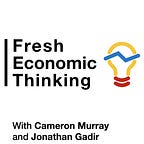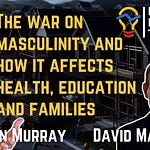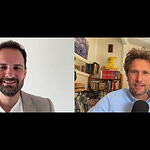Anna Samson has had a decade-long career in aid, was a US State Department-funded Fulbright Scholar, and has a PhD in international relations and American foreign policy.
In this episode we discuss the inadvertent economic and political outcomes of foreign aid on receiving nations.
What surprised me was Anna’s view on the scale of the rent-seeking across the aid industry and the transformation of the aid project into one of strategic military and economic interests rather than one of humanitarianism.
Apologies for the audio quality.
Please read Anna’s full article below about foreign aid, its failures, and its creeping national security objectives.
As always, please like, share, comment, and subscribe. Thanks for your support. Find Fresh Economic Thinking on YouTube, Spotify, and Apple Podcasts.
Theme music: Happy Swing by Serge Quadrado Music under Creative Commons Licence CC BY-NC 4.0
The United States has had its fair share of Presidential foreign policy doctrines over the years.
The Truman Doctrine underpinned America’s Cold War containment policy to stop the spread of communism and Soviet influence.
After the 2001 terrorist attacks on the World Trade Centre, the Bush Doctrine brought us preventative military strikes and the ‘if you’re not with us, you’re against us’ principle.
Just over 50 days into his second term, the Trump Doctrine is shaping up to be ‘you can’t make an omelette without blowing up the entire chicken coop’.
Nowhere has this approach been more sharply felt than in the dismantling of USAID, a cornerstone of contemporary US foreign policy.
Jettisoning USAID has achieved symbolic and practical purposes; it is both exactly what MAGA fans hoped for and what its critics feared: Trump embracing radical honesty in international relations by saying the quiet bits out loud and rupturing the mythology of the self-limiting guardrails on Executive power.
Moments after his inauguration, President Trump, bolstered by Elon Musk’s analysis of USAID as “not an apple with a worm in it [but] a ball of worms”, froze $60 billion in overseas development aid and then stood down 97% of its staff.
Industry veterans highlighted the catastrophe the Executive Orders caused: polio vaccination programs halted, tonnes of food aid left rotting in warehouses in the midst of famines, and a stop on urgent humanitarian assistance delivered to hard-to-reach conflict zones.
That’s the problem with applying a Silicon Valley move-fast-and-break-things mindset to government policy: you can’t just CTRL-Z your way out of any unintended consequences.
The recent Supreme Court decision ordering the Trump Administration to immediately unfreeze US$2 billion in existing aid contracts only provides temporary reprieve for those relying on American development assistance. The ruling doesn’t apply to billions in planned program funding or USAID jobs that have already been axed, both of which are the subject of separate legal challenges.
To the President’s detractors, gutting USAID is ideological and myopic. But it’s also another example of Trump seeing which way the crowd is moving and running out in front.
Indeed, rather than leaping to fill the void left by the US vacating the field, UK Prime Minister Keir Starmer announced a 40 per cent cut to his country’s aid budget. France and the Netherlands are also cutting their aid expenditure by about a third.
While Western aid workers are wringing their hands and UN buildings are lowering their thermostats as a cost-saving measure, the sector bears a great deal of responsibility for its own demise.
With little evidence to show aid programs are delivering on their grand promises of economic prosperity and development, spending billions on aid is increasingly justified as a tool to advance donor countries’ national security interests.
This connection is not new: the modern aid system was built by imperial powers to help maintain influence even as their former colonial territories were achieving political independence.
It should come as no surprise that many aid recipients are not exactly mourning USAID’s downfall. They point to numerous instances where USAID used humanitarianism as a front for meddling in other nations’ domestic politics.
For all the talk of ‘empowerment’ and ‘local partnerships’, government-funded foreign aid is rooted in and continues to reproduce historical structures of resource extraction, dependence, market distortion and racism.
Explicitly blurring the lines between humanitarianism and self-interest lays bare the iron fist of neocolonialism within the velvet glove of benevolence.
From the perspective of donor countries, all this real-talk about interests over altruism requires the aid industry to demonstrate bang for taxpayer buck.
It’s no accident that among the first casualties in DOGE’s USAID cuts were expat bureaucrats enjoying all the cushy accoutrements that a career in the aid industry guaranteed.
Government donor agencies - including Australia's Department of Foreign Affairs and Trade (DFAT) — frequently administer aid money inefficiently and ineffectively; 40 per cent of Australian aid investments were rated as 'unsatisfactory' upon completion.
If the aim of aid is to bolster our own security, not only should this causal link be established more directly, DFAT should explain why Australia funds aid over other defence spending with a clearer line of sight to maintaining the nation’s middle power status.
Current approaches to aid program evaluations, including in DFAT’s most recent Performance of Australian Development Cooperation Report 2023-24, do not provide that level of accountability. Taxpayers are expected to accept measures like “capacity building” and numbers of individuals “supported” or “reached” in pursuit of development goals.
USAID’s abolition, while confronting in its audacity, should not be met simply with self-righteous indignation about the supposed nobility of aid work or showing how aid can be weaponised to undercut the West’s rivals.
Instead, it should be seen as an opportunity to rethink the whole foreign aid system. It's a chance to create a world where countries drive their own development and self-interested ‘generosity’ and donor dependence are no longer required.
Decoupling foreign aid from national security will allow this money to do what it does best: humanitarian action based on foundational principles of humanity, impartiality, independence and neutrality.











